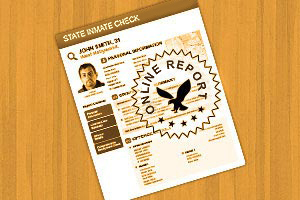Texas Public Records
The mission of Texas State Records is to provide the general public with an easy and straightforward method to search for, examine, and obtain public records, arrest records, court records, and more. This is in accordance with the Texas Public Information Act - legally known as Texas Government Code Chapter 552 - which specifies that government information and records are presumed available to the public. The primary goal of this website is to facilitate the search of state records efficiently and concisely without requiring the requester to provide specific or sensitive information about themselves, including the reason for which the record is sought. This applies to all public records generated by government, court, or law enforcement agencies, except those designated as confidential, redacted, rescinded, or otherwise made unavailable by law, constitutional mandate, or court decision.
Texas State Records maintains information concerning criminal, court, and vital records and over 250 million additional public records.
Are Texas Records Public?
Yes. In compliance with the Texas Public Information Act (PIA), Texas records are open to the public. Any information generated, gathered, filed, or preserved by county governments, city governments, and public agencies in connection with official business is considered public. Public records may also include information collected by certain private entities or non-profit organizations that receive government funding.
Members of the public may conduct paid or free public data searches through record custodians to view, inspect, or get copies of these government-generated documents. Texas public records may be written, typed, photographed, taped, recorded digitally, or transmitted electronically. Regardless of the form in which the information is stored, persons can submit Public Records Act requests to access Texas public records as long as the document - or information therein - is not confidential or exempted by law.
What is Considered Public Information in Texas?
According to Texas Government Code, Chapter 552, Texas public records include:
- Public sex offender information: In Texas, the disclosure of sex offender information is governed by statutes related to sex offender registration and notification laws. This information is typically made available through the Texas Department of Public Safety's Sex Offender Registry, per the Texas Code of Criminal Procedure provisions.
- Public crime statistics: The reporting and publication of crime statistics in Texas can often be found within law enforcement agencies' annual reports or publications in compliance with the Texas Government Code. Agencies like the Texas Department of Public Safety or local law enforcement entities are responsible for compiling and disseminating crime statistics.
- Public Texas inmate records: Texas inmate records and information are generally considered public records accessible through the Texas Department of Criminal Justice. The Texas Government Code might detail the requirements for managing and public accessibility of inmate records.
- Public court records: The accessibility of Texas court records is governed by the Texas Public Information Act and specific provisions within the Texas Government Code.County or district clerk offices maintain these records and they may be available for public inspection unless sealed by court order.
- Public vital records, such as Texas divorce records, Texas death records, Texas marriage certificates/licenses, or Texas birth certificates
- Public criminal records: Texas criminal records, which include information about an individual's criminal history and convictions, are considered public information. However, certain restrictions and privacy laws may govern who can access these records and for what purposes. They are accessible through local law enforcement agencies and the Texas Department of Public Safety.
- Public Texas police reports: Texas police reports are deemed public record, although there might be exceptions for ongoing investigations or sensitive information that could compromise public safety or privacy. These reports can include details of incidents, accidents, arrests, and other interactions with law enforcement. They are often accessible through the police department where the report was filed or through public records requests.
However, not all government-generated records are subject to public disclosure. Some documents have discretionary disclosure, while other information or records may fall under statutory exemptions from public access.
How Do I Find Public Records in Texas?
In line with the Texas Public Information Act, government bodies in Texas grant access to public records online or upon request made by interested persons. Typically, individuals can find and get copies of public records (for example, public vital records) in Texas by following these quick steps:
1. Determine the type of record needed and record custodian
Before making a request, interested persons need to identify what record or type of information is needed. Determining this will further help persons know which Texas department has custody of the record and how to request it. For instance, persons who wish to obtain an arrest report must know which law enforcement agency made the arrest, and individuals interested in court records must know which court the case was filed in. Persons may also decide the specific information needed with respect to the number of pages or the particular period covered by the record.
2. Establish availability of record
Persons should determine if the required record or information is public or confidential according to the law. In some cases, interested persons may also contact the custodian to determine how to access the needed information. Some government bodies may specify how to do a public record search or request on their website and provide online or downloadable request forms. Lastly, some records like court dockets or sex offender information may be available online, and persons may not need to make formal requests.
3. Make a request
After determining how to access public records in Texas, persons may continue by making requests if online access is not available or required. Interested individuals may request in person, via mail, or through other channels. In-person requests may require requesters to take along valid identification or a previously filled form downloaded from the custodian's page. Otherwise, the requester may fill out request forms in person. The requester may need to provide the following details in the form before submitting it in person:
- Record type
- Specific record descriptions like record subject's name, case number, and related dates
- Requester's name and contact details
- Other specifications on certifying documents, maximum cost available for search, and so on
- Preferred delivery method
- Mailing address, fax number, or email address for record delivery
For mailed requests, requesters may also use request forms or write a request letter containing this necessary information and mail it to the appropriate address along with required fees or other supporting documents, such as a photocopy of a valid ID or consent letter. The same applies to requests made online, via email, or by fax.
The time needed to process requests often varies depending on the medium used to make the request. Some custodians provide same-day services to requesters who make requests in person or pay for expedited requests via mail (for an extra charge).
4. Pay fees
Requesters may pay fees with the request or after the custodian sends confirmation mail approving the request and specifying the amount needed to search for or duplicate the record. Requesters should note that while custodians are allowed to charge service fees for record search or duplication as per Section 552.156 of the Texas Government Code, the charges should not exceed the standard fee structure. Requesters should make payments through the platforms accepted by the custodian.
How Do I Look Up Public Records in Texas for Free?
In Texas, persons can usually view or inspect paper records for free, especially if the pages are few and does not contain confidential information that requires redacting. However, obtaining physical copies of documents comes with charges on most occasions. The ability to carry out free public record searches in Texas depends on the record type and the government body responsible for maintaining records and disseminating requested information. For example, individuals may view or inspect Texas public records for free in person at public access terminals provided by some custodians, such as the county clerks that provide public access terminals to view court dockets or case information.
Furthermore, online databases, indexes, and public access portals may be available to researchers depending on the record needed. For instance, some county sheriffs have online databases for finding arrest logs and inmate records for free. In the same way, many Texas county clerk's offices (which also carry out county recorder duties) provide free online databases for searching real property or land records. Other government bodies provide online access to non-confidential information like sex offender information and crime statistics.
Texas began creating public records in 1839, usually containing information from the state’s 254 counties. Both third-party and governmental websites can now offer public records with increased reliability, thanks to the initiative to digitize public records, a process that began three decades ago. This ensures a fair and just society for the people of Texas and the United States.




